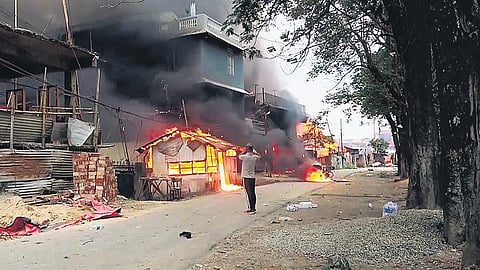‘Greater Mizoram’ may resurface post-Manipur riots
The demand for a separate tribal state by Kuki tribespeople in Manipur, which has surfaced after the deadly riots in the state, may soon take a new turn.
The Kukis are ethnic cousins of the Mizos and the Chins of Myanmar, and have been accused after the riots of encouraging substantial illegal migration of the Chins into the state, and for the large-scale cultivation of poppy. The latter has been encouraged by Burmese drug lords seeking to produce in India for the Indian market.
The Meiteis, who have been the ruling race of Manipur and constitute just over 50% of the state’s population, have long complained of a lack of living space in the Imphal Valley and opposed the grant of autonomy under the Sixth Schedule to the Kukis and Nagas, the two tribal communities who make up more than 40% of Manipur’s population.
Now the violence has led to fresh demands for a separate Kuki state, but there are already indications that this may turn into a demand for ‘Greater Mizoram’, something which groups in Mizoram, including the now ruling Mizo National Front (MNF), have raised in the past.
Like the National Socialist Council of Nagaland (NSCN) raised the demand for “Greater Nagalim” by integrating all Naga-inhabited territories of India and Myanmar with the Indian state of Nagaland, the MNF and groups backing it had wanted a “Greater Mizoram” by integrating all Kuki- and Chin-inhabited areas with the Indian state of Mizoram—because the Kukis, Chins and Mizos (also called Lushais) are part of the same Zomi tribe.
After the present round of violence and state repression against the Kukis in Manipur, many Mizo politicians have publicly articulated that the Kuki areas of southern Manipur should be integrated with Mizoram since the Kukis can “no longer live with safety and dignity in Manipur”.
The Mizoram politicians, including Chief Minister Zoramthanga, have been critical of the violence against Kukis and discrimination against them by Manipur’s Meitei-dominated administration.
Sources in the Mizo National Front suggest the demand for integration of the Kuki areas of Manipur with Mizoram is gaining ground within the party.
When the MNF returned to the national mainstream after the 1986 Mizo Accord, it went quiet on the “Greater Mizoram” demand.
During its rebellious days, the MNF had set up bases in the Mizo-Kuki areas of these neighbouring states and the Zomi and Chin areas of Myanmar to fight the Indian military. The Zomis and Chins, like the Kukis, are also ethnic cousins of the Mizos, which is a generic identity built around the big Lushai tribe.
So, “Greater Mizoram”, like the “Greater Nagalim” demand of the National Socialist Council of Nagaland, served as a support mobilisation tool and a political bargaining chip. But since 1986, no important political party in Mizoram has raised the “Greater Mizoram” demand, and the issue died down.
For the Kuki groups (both civil society and insurgent organisations and political elements in various parties), “Greater Mizoram” will be a bargaining chip in their quest for extensive autonomy—like the separate Bodoland state helped the Bodo tribal groups wrest a Territorial Council in Assam in the last decade.
Under Chief Minister N Biren Singh, the BJP government’s non-responsiveness to demands of tribal autonomy and its attempted Meitei consolidation to stay in power has led to ethnic polarisation, further aggravated by the saffronite penchant for introducing religiosity as a dividing line—the Meiteis are Vaishnavite Hindus and Kukis, like the Nagas, are Christians.
The latest violence in Manipur stems from a plan to grant the Meiteis the status of Scheduled Tribe (ST). That would ensure for them special quotas in government jobs and educational institutions.
Tribal leaders say Meiteis should not get the benefit of these quotas because they already have a monopoly over government jobs and might use the ST status to gain access to the forest lands occupied by tribals for centuries.
But the Meiteis have a point in seeking additional living space in the hills—Imphal Valley is clearly overcrowded.
The Biren Singh government has every right to stop poppy cultivation, but it must provide the tribespeople with a viable alternative like spices or rubber (as in neighbouring Tripura).
There is also no point in defaming all Kukis as drug producers because Burmese drug lords depend on all in power to peddle their wares. One can realise the nexus of big politicians and drug lords from the operations unleashed by former super cop Th Brinda, who found it difficult to continue in the state police after she went after people in high places for involvement in drug smuggling.
The state police have been blamed for siding with the Meiteis and even handing over large quantities of weapons to them to recover the dropboxes placed in various parts of the state.
The irony is that those who return these illegally secured weapons will not be prosecuted—this is written on the dropboxes. Only 1,000 of the 4,000 weapons given away from police armouries have been recovered so far.
The only way to bring Manipur back to normalcy is to kick-start a process of inter-ethnic dialogue to work out a roadmap for long-term ethnic reconciliation—even as security forces try to restore law and order. The solution must be political and address the bonafide aspirations of all communities.
Subir Bhaumik
Former BBC journalist and author on South Asian conflicts

